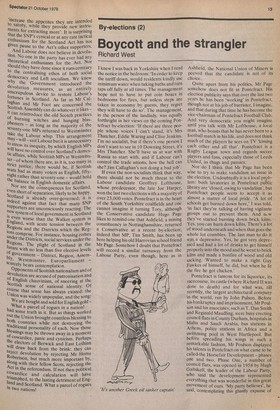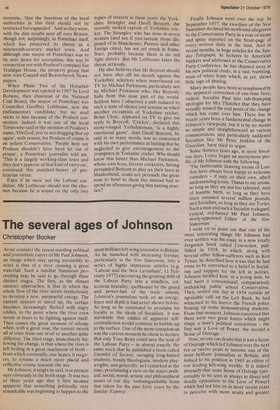By-elections (2)
Boycott and the strangler
Richard West
I knew I was back in Yorkshire when I read the notice in the bedroom: 'In order to keep the tariff down, would residents kindly use minimum water when taking baths and turn taps off fully at all times. The management hope not to have to put coin boxes in bedrooms for fires, but unless steps are taken in economy by guests, they regret they will have to do so'. The management, in the person of the landlady, was equally forthright in her views on the coming Pontefract by-election: 'If there are three people whose voices I can't stand, it's Mrs Thatcher, Eddie Waring and Clive Jenkins. I'm no socialigt, but if there's one person I don't want to see in 10 Downing Street, it's Mrs Thatcher. She'll have us at war with Russia to start with, and if Labour can't control the trade unions, how the hell can she? Jim Callaghan's not doing a bad job'.
If even the non-socialists think that way, there should not be much threat to the Labour candidate Geoffrey Lofthouse, whose predecessor, the late Joe Harper, won the last two elections with a majority of over 23,000 votes. Pontefract is in the heart of the South Yorkshire coalfields and one cannot imagine it turning Tory, although the Conservative candidate Hugo Page likes to remind one that Ashfield, a mining constituency in Nottinghamshire, returned a Conservative at a recent by-election; indeed that MP, Tim Smith, has been up here helping his old Harrovian school friend Mr Page. Somehow I doubt that Pontefract will record a similar turnaway from the Labour Party, even though, here as in Ashfield, the National Union of Miners is peeved that the candidate is not of its choice.
Quite apart from his politics, Mr Page somehow does not fit in Pontefract. His election publicity says that over the last two years he has been 'working' in Pontefract, though not at his job of barrister, I imagine, and that during that time he has become the vice-chairman of Pontefract Football Club. And very democratic you might imagine until you talk with Mr Lofthouse, a local man, who boasts that he has never been to a football match in his life, and does not think much of the players he sees on TV 'kissing each other and all that'. Pontefract is a Rugby League town and regards soccer players and fans, especially those of Leeds United, as thugs and pansies. Nor do I think that Mr Page has been wise to try to make vandalism an issue in the election. Undoubtedly it is a local problem: both lavatories in Pontefract public library are 'closed, owing to vandalism', but Pontefract people seem to accept it as almost a matter of local pride. 'A lot of schools get burned down here,' I was told, 'in fact they're talking of having vigilante groups out to prevent them. And rk-w they've started burning down brick kilns. Yes, you can burn down kilns. There's a lot of wood underneath and when that goes the whole lot crumbles. The last man to do it wo a depressive. Yes, he got very depressed and had a lot of drinks to get himself properly into the mood and he went to brick kilns and made a bonfire of wood and old sacking. Wanted to make a right Guy Fawkes of himself, he did, but when he lit the fire he got chicken.'
Pontefract is famous for its liquorice, its racecourse, its castle (where Richard II was done to death) and for what was, till recently, the largest architectural company in the world, run by John Pulson. Before his bankruptcy and imprisonment, Mr Poulson and his associates, such as T. Dan Smith and Reginald Maudling, were busy erecting council flats in County Durham, hospitals in Malta and Saudi Arabia, bus stations in Athens, police stations in Africa and a swimming pool in West Hartlepool. But before spreading his wings in such a remarkable fashion, Mr Poulson displayed his talents in Pontefract on what came to be called the Horsefair Development — phases one and two. Phase One, a number of council flats, was opened in 1958 by Hugh Gaitskell, the leader of the Labour Party, who said the development represented everything that was wonderful in this great movement of ours. 'My party believes', he said,, contemplating this ghastly expanse of concrete, 'that the functions of the local authorities in this field should not be restricted but expanded'. And so they were, with the dire results seen all over Britain, though not, surprisingly, in Pontefract itself, which has preserved its charm as a nineteenth-century market town. And although one mayor of Pontefract was to be sent down for corruption, this was in connection not with Poulson's company but Trafalgar House, the property group that now runs Cunard and Beaverbrook Newspapers.
When Phase Two of the Horsefair Development was opened in 1967 by Lord Robens, then chairman of the National Coal Board, the mayor of Pontefract was Councillor Geoffrey Lofthouse, now the parliamentary candidate; but no mud sticks to him because of the Poulson connection. Indeed it was one of the local Tories who said at the mention of Poulson's name, 'Oh God, you're not dragging that up again', with reason, for Poulson of course is an ardent Conservative. 'People here say Poulson shouldn't have been let out of prison', a Pontefract journalist told me. 'This is a largely working-class town and they don't approve of that kind of carry-on', continued this standard-bearer of proletarian virtue.
E'en if he were not the Labour candidate, Mr Lofthouse should win the election because he is sound on the only two topics of interest in these parts: the Yorkshire Strangler and Geoff Boycott, the recently sacked captain of Yorkshire cricket. The Strangler, who has done in seven women (and ten if you include those disposed of in Manchester, Preston and other foreign cities), has not yet struck in Pontefract, probably because there is no red light district. But Mr Lofthouse takes the threat seriously.
He also believes that Mr Boycott should not have shot off his mouth against the Yorkshire selectors when interviewed on TV by Michael Parkinson; particularly not by Michael Parkinson who, like Boycott, hails from this dour part of the world. Seldom have I observed a pub reduced to such a state of silence and tension as when another ex-captain of Yorkshire cricket, Brian Close, appeared on TV to give his reply to Boycott. 'Cricket', declared this stony-visaged Yorkshireman, 'is a highly emotional game'. And Geoff Boycott, he said in so many words, was so concerned with his own performance at batting that he neglected to give encouragement to the youngsters in Yorkshire cricket. Who should know this better than Michael Parkinson, whose own boys, fervent cricketers, having persuaded Boycott to play on their lawn at Maidenhead, could not persuade the great man to bowl to them but instead had to spend an afternoon giving him batting practice?







































 Previous page
Previous page